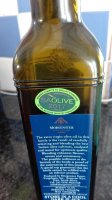Kartoffel
Member
- Joined
- Sep 29, 2017
- Messages
- 1,199
On the common sense level the results make sense as higher olive oil consumption would displace PUFA consumption associated with accelerated aging.
Yes, of course. But how do you know that? Because controlled experiments have demonstrated the toxicity of excess PUFA beyond any doubt, and illuminated how they harm all mammals. Controlled experiments are the only form of science that can establish anything close to causational statements. There is no way to account for even a tiny percentage of all possible confounding variables, because we don't know most of them, and the process of identifying and "accounting" for them is based on stupid theories. Why do you think there are so many analyses showing positive correlations between soy oil/fish oil/whole wheat/etc and various health markers? There is no statistical method without a prior theory of causation. You can show absolutely anything with these studies, if you just know how to properly analyze (manipulate) data.
If you want to know whether olive oil is (more) protective against aging than XYZ, you can just get a bunch of animals, keep everything else constant, and then feed them different fats. Simple, elegants studies are what drives science, not correlation studies.

